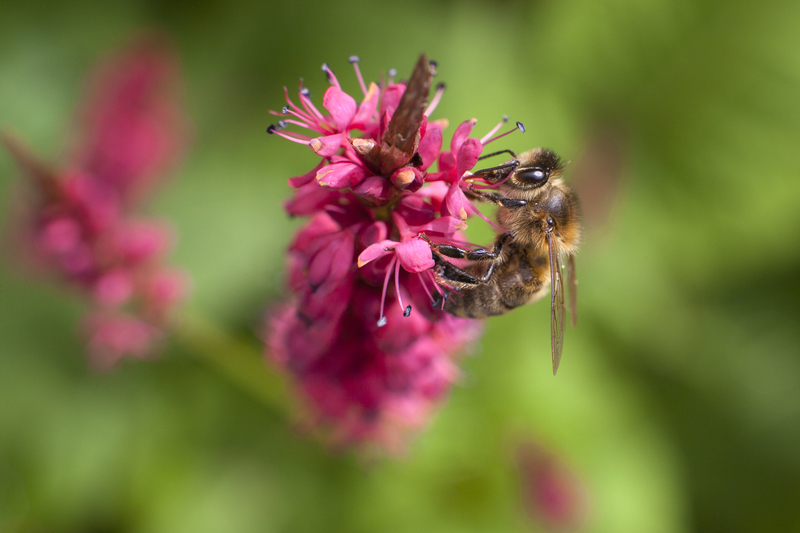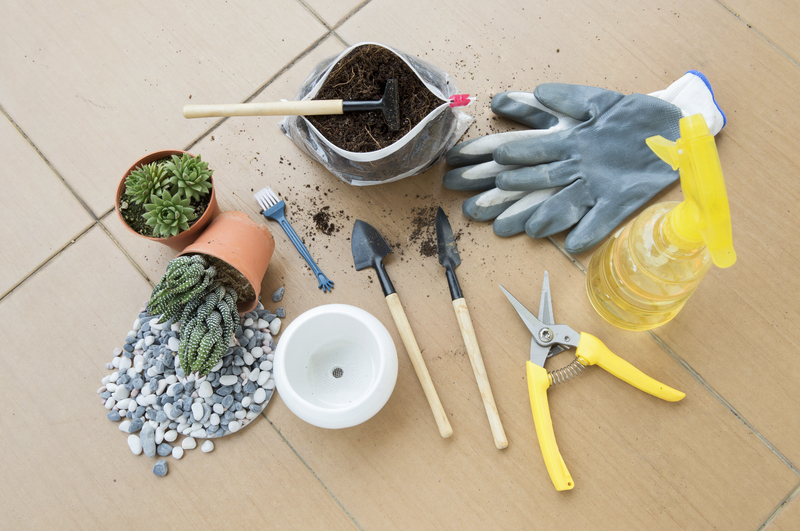Organic Waste: A Path to Lush Soil
Posted on 06/09/2025
Organic Waste: A Path to Lush Soil
In a world where sustainability and environmental consciousness are increasingly vital, organic waste has emerged as a powerful resource for cultivating nutrient-rich, lush soil. Transforming food scraps, yard trimmings, and other biodegradable materials into fertile earth not only reduces landfill waste but also rejuvenates gardens, farms, and landscapes. In this comprehensive guide, we'll explore how organic waste management can create a thriving ecosystem right beneath your feet.
What is Organic Waste?
Organic waste comprises biodegradable materials that originate from plants or animals. Typical examples include vegetable peels, fruit remains, coffee grounds, eggshells, yard leaves, grass clippings, and even paper products. Unlike inorganic waste, these materials decompose naturally, releasing nutrients back into the soil.
- Kitchen waste - Fruit and vegetable scraps, coffee grounds, bread, and eggshells.
- Garden waste - Leaves, grass cuttings, wood chips, and small branches.
- Animal waste - Manure from herbivorous animals (do not use pet or human waste unless specifically processed).
- Paper waste - Uncoated, non-glossy paper and cardboard.

The Environmental Burden of Untreated Biodegradable Waste
While organic trash appears harmless, sending these materials to landfills can have unintended consequences:
- Methane Emissions: In landfills, organic materials often decompose anaerobically, producing methane, a potent greenhouse gas.
- Leachate Formation: Decomposing food waste can generate toxic leachate, contaminating soil and groundwater.
- Lost Nutrients: When we discard biodegradable waste, we lose valuable nutrients that could have enriched our gardens and agricultural lands.
Therefore, managing organic waste responsibly is not only eco-friendly--it's essential for building and maintaining fertile soil.
How Does Organic Waste Improve Soil?
Turning organic matter waste into soil amendments provides several vital benefits:
- Restores Soil Structure: Organic material helps soil retain moisture, supports aeration, and creates a crumbly, workable texture for plant roots.
- Feeds Soil Life: Decomposing matter nourishes a dynamic web of earthworms, fungi, and microorganisms. These creatures are crucial for healthy soil.
- Releases Essential Nutrients: Compost and other organic inputs supply nitrogen, phosphorus, potassium, and trace minerals slowly--delivering long-lasting fertility.
- Improves Water Retention: Organic-rich soil absorbs and holds water efficiently, reducing runoff and drought stress.
- Suppresses Plant Diseases: Healthy soils with active microbial life can outcompete plant pathogens and reduce disease outbreaks.
In short, transforming organic refuse into soil amendments is a time-honored, natural system for boosting soil productivity and sustainability.
Methods for Turning Organic Waste into Fertile Soil
There are several tried-and-true techniques for harnessing the power of organic kitchen waste and garden debris. Here are the most popular methods:
1. Traditional Backyard Composting
Composting transforms discarded organic matter into a dark, crumbly, rich soil conditioner. Here's how to start:
- Designate a bin or pile in a shaded, well-drained area.
- Alternate layers of "greens" (e.g., vegetable scraps, coffee grounds, fresh grass) with "browns" (dead leaves, straw, shredded newspaper).
- Keep the pile moist but not soggy, and turn it every few weeks for aeration.
- Compost is ready in 2-12 months, depending on conditions.
2. Vermiculture (Worm Composting)
Worm farming uses earthworms--typically red wigglers--to break down organic garbage into nutrient-rich castings. This method is perfect for small spaces and indoor setups.
- Prepare a worm bin using a shallow container and bedding (moist newspaper or coconut fiber).
- Add a handful of worms and start feeding them kitchen leftovers (avoid meat and dairy).
- Harvest worm castings every few months--these are excellent for potted plants and gardens.
3. Bokashi Fermentation
Bokashi composting uses a special inoculant of beneficial microbes to ferment all types of food waste--even meat and dairy--inside a sealed bucket. The pre-composted material is then buried in the garden, where it quickly breaks down and feeds soil life.
4. Sheet Mulching (Lasagna Gardening)
Simply layering organic waste directly onto garden beds (alternating "green" and "brown" layers) turns the soil beneath into a lush, microbe-rich environment. Over months, the layers compost in place, feeding the earth and suppressing weeds.
5. Trench Composting
Dig a trench or pit in the garden, fill it with kitchen scraps and yard waste, then cover it with soil. The buried organic waste will slowly break down underground, directly nourishing plant roots above.
Best Practices: What to Include and Avoid in Organic Waste Recycling
What You Can Compost
- Fruit and vegetable peels
- Coffee grounds and tea leaves
- Eggshells
- Grass clippings and leaves
- Non-glossy paper and cardboard
- Woody prunings (chopped small)
- Manure from plant-eating domestic animals
What to Exclude
- Meat, fish, and dairy (unless using Bokashi)
- Oily or greasy foods
- Diseased plants or invasive weeds
- Pet and human waste
- Glossy or coated papers, plastics, and metals
- Treated or painted woods
Following these guidelines ensures your organic waste recycling efforts create safe, effective soil amendments.
The Role of Compost in Building Lush Soil
Compost is often hailed as "black gold" for gardeners--deservedly so! Applying compost improves virtually every aspect of soil health:
- Increases plant growth and yields
- Boosts disease resistance
- Reduces chemical fertilizer and pesticide needs
- Buffs up the soil's resilience to drought and erosion
- Promotes biodiversity in the soil ecosystem
Applying 2-4 inches of well-aged compost annually can transform poor or lifeless dirt into thriving, lush soil perfect for flowers, lawns, vegetables, and trees.
Advanced Techniques: Incorporating Biochar and Green Manures
Biochar
Biochar is a form of charcoal made from organic materials that's used as a soil amendment. When mixed into compost or garden beds, it improves nutrient retention, water-holding capacity, and provides habitat for soil microbes--all supporting soil fertility.
Green Manures
Green manure crops (such as clover, vetch, or rye) are grown and then plowed under to return organic matter and nutrients directly to the soil. This sustainable practice cycles nutrients efficiently, enhancing the regenerative capacity of the earth beneath your feet.
Common Mistakes to Avoid When Composting Organic Waste
- Not balancing greens and browns: Too much green waste can lead to smelly, slimy compost. Too many browns slow decomposition.
- Ignoring moisture levels: Compost should be damp like a wrung-out sponge, not soggy or too dry.
- Neglecting to turn the pile: Oxygen fuels decomposition. Stir or aerate regularly.
- Adding inappropriate materials: Avoid pet wastes, meat, dairy, or treated wood which can invite pests or introduce toxins.
- Composting diseased plants: Unless your compost reaches "hot" temperatures (above 130?F/55?C), disease organisms might persist.
Avoiding these common pitfalls ensures your organic material recycling project results in clean, healthy amendments for your garden.
The Urban Perspective: Organic Waste in the City
Urban dwellers may not have large yards, but there are still many opportunities to convert organic kitchen waste into valuable fertilizer:
- Try worm composting under the sink or on the balcony.
- Participate in community composting programs if space is limited.
- Use countertop Bokashi bins to ferment food scraps and transport the pre-compost to a local garden for final decomposition.
- Contribute to urban farms and public gardens seeking organic waste donations.
Benefits of Soil Enriched with Organic Waste
Harnessing composted organic waste results in a myriad of environmentally sustainable and practical benefits:
- Reduces landfill use and lowers municipal waste management costs
- Cuts greenhouse gas emissions
- Builds healthy, lush topsoil necessary for climate resilience
- Protects local waterways by minimizing fertilizer runoff
- Supports pollinators and beneficial soil organisms
- Increases food security by boosting garden yields
- Restores contaminated or exhausted lands to productivity

Frequently Asked Questions About Organic Waste and Lush Soil
How long does it take for organic waste to turn into usable compost?
The process varies depending on the type of waste, composting method, temperature, and maintenance. Typical backyard composting takes 3 to 12 months, while vermicomposting and Bokashi can speed up the process.
Can you compost cooked food or bread?
Small amounts of plain, cooked vegetables and bread (without excessive oil or dairy) can go into traditional compost; Bokashi bins accept a wider range of food scraps.
Is using organic waste safe for all plants?
Absolutely! When fully decomposed, organic amendments are suitable for vegetables, ornamentals, fruit trees, and lawns. Avoid applying fresh, undecomposed waste directly to sensitive plants.
What if I don't have space to compost at home?
Many communities now offer curbside organic waste collection or have drop-off locations for food and yard scraps. Other options include partnering with local urban gardens or using innovative small-space composting techniques.
Conclusion: The Fertile Future of Organic Waste
The journey from organic waste to vibrant, lush soil is an essential cycle in nature's design. By repurposing food scraps, lawn clippings, and other biodegradable matter, we not only nurture our gardens--we restore the earth itself. Whether you're an urban dweller with a countertop composter or a rural gardener with sprawling beds, every bit of organic material recycling brings us closer to a greener future.
So, embrace the path to lush soil! With every composted peel and every turned pile, you become a steward of the planet, fostering regeneration and abundance for generations to come.
Latest Posts
Solutions for Soothing the Winds in Your Garden Sanctuary
From Lawn to Lounge: Designing Amazing Garden Seating Spaces
Nature's Playground: Building a Child-Friendly Garden Haven

